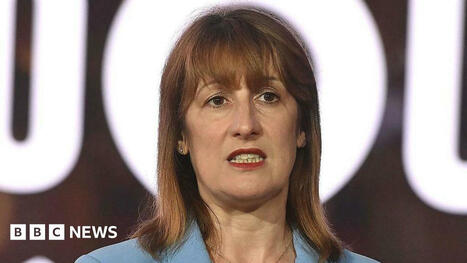Sales volumes rose by a stronger-than-expected 0.6% in July, official statistics show.
Get Started for FREE
Sign up with Facebook Sign up with X
I don't have a Facebook or a X account

 Your new post is loading... Your new post is loading...
 Your new post is loading... Your new post is loading...
Exclusive: Cross-party Poverty Strategy Commission says abolishing limit would be part of its ‘once in a generation’ plan
Graham Watson's insight:
A cross-party Commission - the Poverty Strategy Commission - has made the case for scrapping the two-child benefit cap, arguing that it is the best way of reducing poverty and that it would "lift 4.2 million people out of poverty, including 2.2 million people stranded in “deep poverty”.
The problem is that this comes at a time when the state of the public finances makes such an increase in government spending virtually impossible to envisage.
As date set, chancellor acknowledges UK economy is ‘not working well enough for working people’
Graham Watson's insight:
The date of the Budget has been set for 26 November, a fiscal policy jamboree and an opportunity to use fiscal policy to stimulate the economy. It's clear that there are challenges, not least with regard to the public finances and poverty reduction, and these certainly aren't going to be resolved overnight, but it represents a chance to take discretionary action to affect macroeconomic objectives.
The cost of government borrowing has risen again - what does it mean for the public finances and upcoming Budget?
Graham Watson's insight:
And here's Faisal Islam's verdict on the factors that have driven bond yields upwards because of uncertainty about the state of public finances. However, he notes that its not specific to the UK because of concerns about public finances in the Eurozone.
The wider implications of this are that there needs to be coherence of fiscal policy in next month's Budget to assuage some of these worries.
House prices are growing at around their slowest rate since last summer as calls to reform property tax grow.
Graham Watson's insight:
The state of the UK economy is always an interesting barometer for the state of the wider macroeconomy, and the slowing of the housing market reflects this, but it also reflects how uncertainty affects the level of economic activity with concerns that reform of property tax could make reduce activity in the housing market.
Despite concerns about economy, poll shows optimism about trading prospects at highest level since 2014
Graham Watson's insight:
But, crumbs of comfort, it seems that business confidence is picking up, albeit marginally, with Lloyds Bank suggesting that there's more optimism among the businesses that it surveys than at any time since 2014.
However, that's the danger of taking individual bits of data at face value: I find that claim different to reconcile with other, contradictory bits of data.
Bank of England governor tells Jackson Hole summit that ageing population is adding to the squeeze
Graham Watson's insight:
Andrew Bailey with 'news' of what the long-term future for the UK economy looks like. Demographic change means that the UK is likely to experience slower growth, made worse by the ageing population.
This shouldn't be news: you can't reverse an ageing population easily and thus there needs to be a real focus on productivity.
From
www
Hundreds of Liberty Steel workers in Rotherham and Sheffield face an uncertain future.
Graham Watson's insight:
The UK steel industry looks beleaguered, with the collapse of Speciality Steels UK, part of the Liberty Group. The government has temporarily taken control of the company but I don't see this as indicative of the firm being nationalized. However, with 1,500 jobs at stake, the government will be trying to find potential buyers with a degree of haste.
UK tax data reportedly suggests claims of non-dom exodus overblown | Tax and spending | The GuardianHMRC figures appear to indicate departure of high net worth people is in line with OBR predictions, report says
Graham Watson's insight:
Well, I never! The abolition of non-dom status - scrapped by Rachel Reeves in April, although first mooted by her predecessor, Jeremy Hunt, the previous year - has caused an exodus on non-doms exactly in line with OBR predictions, and not the alarmist suggestions of some.
Growth of 0.3% is a positive sign but the chancellor still has major difficulties to confront
Graham Watson's insight:
Phillip Inman analyses today's GDP figures: he suggests that growth has returned to trend, and that there are signs that the economy's recovering. Optimistic?
From
www
The economy expanded by 0.3% between April to June period, ahead of economists' expectations.
Graham Watson's insight:
Economic growth has slowed to 0.3% in the last quarter, April to June - lower than the 0.7% in the previous quarter, but above what some had expected. Within the figures, there are some interesting difference - the service sector is growing, as is construction - but there are worries about the level of business investment.
Either way, whatever your view, it's self-evident that we're experiencing an ongoing period of uncertainty.
Exclusive: Chancellor also looking at tweaks to capital gains tax to try to bridge £40bn-plus spending gap before budget
Graham Watson's insight:
The debate about the state of public finances, and the inevitability of tax increases in the next Budget is touched upon in this Guardian article which suggests that Inheritance and Capital Gains Tax are likely to be reformed in the hope of boosting tax revenues.
It reflects the need for higher tax revenues, and their relative lack of sources - given the government's commitment to keep other taxes, notably income tax unchanged.
The faux row will be ear-splitting whether Reeves takes a lot or a little. Scepticism about a wealth tax is rising, but there are many ways to skin fat cats, says Guardian columnist Polly Toynbee
Graham Watson's insight:
Polly Toynbee suggests that taxes are going to rise - and that any argument over this is effectively an artificial construct - but asks for the Labour government to get creative about their imposition.
This might take the form of ending VAT exemptions, something even supported by the Institute for Economic Affairs (IEA), and something that's currently regressive. Of course, there are also calls for a wealth tax in some guise or other. As ever in Economics, watch this space. |
Companies say increase in employer national insurance contributions has forced them to cut jobs and raise prices
Graham Watson's insight:
Bank of England data suggests that UK firms laid off workers at the fastest pace in four years over the Summer, largely reacting to higher employers' National Insurance contributions.
The data also gives evidence that this move both increased prices and reduced profit margins.
The chancellor hit back at the idea that the government faces so large a gap between spending and tax income.
Graham Watson's insight:
It's clear that the public finances are a concern, and the notion of a fiscal black hole has been with us since Labour's election victory, but to be fair it's largely a consequence of being set up to fail by the outgoing government.
Equally, the size of the 'black hole' is open to debate with the NIESR estimate of £50bn at the thick end of what most commentators think is the case. Nevertheless, it's clear that the forthcoming Budget is going to see tax increases, but much of the surrounding noise is just that: noise.
The government needs bold policies in the autumn budget that will change the narrative without startling the markets
Graham Watson's insight:
This is the really interesting article today - with a prominent former member of the MPC, Sushil Wadhwani looking at the policy measures that the government might look to introduce to address the curent economic situation without spooking bond markets.
The dilemma is how to strike a balance between fiscal credibility and a pro-growth agenda. There are going to be tough decisions taken on tax and spending, not least in how best to raise tax revenue. The suggestion in the article is that a land tax would be best and not affect levels of capital investment. Equally, he argues that the UK should be emphasising the independence of the Bank of England, in comparison with the meddling of President Trump in the affairs of the Federal Reserve.
The interest rate on UK 30-year bonds hits the highest since 1998 as concerns over the economic outlook continue.
Graham Watson's insight:
Government borrowing costs reflected in the bond yield on 30-year government bonds has reached 5.698%, increasing borrowing costs.
The yield has risen because investors want to hedge against increased risk associated with the uncertainty surrounding the public finances, the state of the UK economy and the prospect of tax rises in the Autumn Budget.
However, such a move also has wider macroeconomic implications.
Conservative leader says it is ‘absurd’ to shift away from fossil fuels and leave ‘vital resources untapped’
Graham Watson's insight:
I guess it depends on your view of climate change as to whether you think that this is a good idea or not. Irrespective of the economic implications of this - and you might argue that either way - I'd suggest that this policy announcement is less about economic growth and energy security than it is about politics, with a Conservative party seeking to appeal to Reform voters.
I wonder if they'll notice who the Conservative party leader is?
Despite sluggish growth and rising borrowing costs, most economists agree that Rachel Reeves doesn’t face a repeat of 1976
Graham Watson's insight:
There's been a bit of chatter on social media and the most unbiased of papers, the Telegraph, suggesting that such is the weakness of the public finances that the UK could seek a bailout from the IMF.
As Richard Partington suggests, that's nonsense and he cites a number of prominent economists in support of this claim. The bulk of his opposition to this position is self-evident - inflation isn't as high as it was, the pound isn't in freefall, and government debt is still heavily over-subscribed.
However, the article is also clear that the public finances remain an issue and need to be watched. The dilemma is that the best way of fixing them in the short-term, via economic growth, seems unlikely, and that the prospect of tax rises in the Autumn's budget might make this even less likely.
The alternatives for the UK chancellor are either unworkable or will lose Labour votes, so here’s what she should try, says Faiza Shaheen of Tax Justice UK
Graham Watson's insight:
Another commentator comes out in support of a wealth tax - again, though, treat articles like this with caution. Wealth taxes are seductive - they're portrayed as a tax on excessive, or unfair, gains but they rarely raise as much revenue as forecast and, it is argued, disincentivize wealth creation.
That said, I'm never convinced that the latter effect is particularly marked.
From
www
Plants in Hull and Redcar have warned they will close without support after deal to allow US ethanol to come in tariff-free.
Graham Watson's insight:
This story is indicative of the fact that industrial policy is fraught with trade-offs: the government has bailed out the steel industry but in this case hasn't intervened to ensure that the UK's bioethanol plants in Hull and Redcar remain open after scrapping the 19% tariff on US exports of bioethanol.
This has wider implications for all sorts of things ranging from the adoption of cleaner fuels to the production of carbon dioxide, used in the soft drinks, medical and nuclear industries.
From
www
Depending on the timeframe you look at, the GDP figures can be seen as glass half full or half empty.
Graham Watson's insight:
Faisal Islam's take - suggesting that the UK is still the fastest growing G7 economy for the first half of the year, but that any growth that is occurring is fitful and might not be sustained, which would pose problems for the public finances going forward.
However, to be fair, the fiscal inheritance of the current government was far from great and that's something that some of the government's critics conveniently overlook.
Editorial: IHT is unpopular, but voters can be persuaded if the argument is about levelling life chances for young people
Graham Watson's insight:
It seems as though Inheritance Tax is going to rise - although the Guardian speculates that provided that the government can construct a narrative about it improving equality of opportunity, it needn't be unpopular.
I doubt it: just reading social media will tell you that a tax that only affects 4% of all estates is mainly opposed by people who have no chance of paying it.
The rise in NICs, Trump’s tariffs and weak consumer spending have hit firms but there are crumbs of comfort for the chancellor
Graham Watson's insight:
Richard Partington analyses yesterday's labour market data and concludes that whilst the data implies a slowdown, it's far from catastrophic. For now.
From
www
Tariffs, Brexit, pandemic havoc... All of this caused short-term disruption - but the impact concealed a deeper problem for the UK automotive industry
Graham Watson's insight:
This lengthy Theo Leggett piece on the BBC website looks at the degree to which the UK car industry has shrunk and the implications of this for the macroeconomy.
The number of cars being produced in the UK has halved over the last 20 years, and it's expected that this year will see around 750,000 cars produced, a level of production last seen in the 1950s.
The article is interesting because it highlights the fact that although car output is falling there is still work available in the supply chain for small firms nimble enough to diversify. However, the overall effects of the decline of the sector are likely to be significant if the example of the closure of the Vauxhall plant in Luton is anything to go by. |


































Respite for the government because higher than expected retail sales implies higher than expected growth, but in the grand scheme of things, it also suggests that we've entered another one of those push-me, pull-me phases of economic growth where reading too much into a single piece of data would be lunacy.